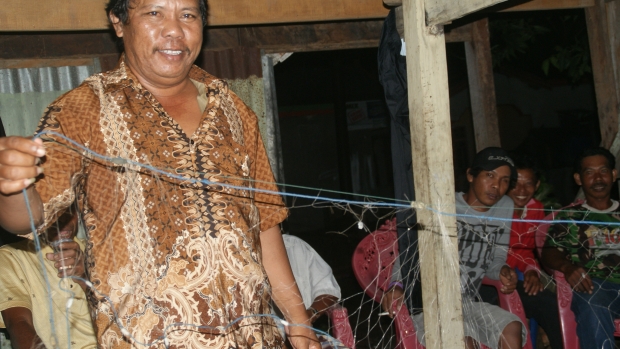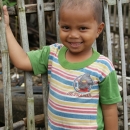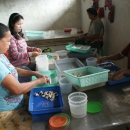Grants :: Small Grant Facilities :: Empowering Coastal Communities in Mangrove Forest Areas of Makassar, South Sulawesi
Empowering Coastal Communities in Mangrove Forest Areas of Makassar, South Sulawesi

Bachtiar, head of the fishermen IPPM Makassar , Makassar, Indonesia © Hanying Li, 2010
Objectives
This project sought to increase community awareness of the importance of coastal conservation and mangrove planting, to facilitate mangrove planting action plans, and to increase local incomes by developing a mud crab fishery business.
Another objective was to help Bira Lantebung, a remote community historically distrustful of outside interference, to integrate its needs and interests with state coastal conservation and development interventions.
Background
Most inhabitants of Bira Lantebung live below the poverty line, subsisting mainly on crab and shellfish gathering, farming, and, to a certain extent, factory labour. The Community Research and Development Institution of Makassar (IPPM) selected Bira Lantebung as a Small Grants Facility (SGF) project site because of its high rate of coastal erosion and severely degraded hydrological regime, the community’s low income, the critical state of its remaining mangroves, and the limited local awareness of mangrove rehabilitation.
Target beneficiaries
Principally the community members of Bira Lantebung and, initially, the fisher groups.
Outputs
- In the project’s first quarter 80,000 mangrove seedlings were planted. In the last quarter, 46,000 more seedlings were planted to replace mangroves lost in extreme weather events. The seedling survival rate was about 80%.
- Six mud crab culture cage units were developed and tested by the community.
- Training in mud crab cultivation was carried out using the cage units. This training was later put into practice by developing a mud crab cultivation business.
- The community was actively involved in creating land-use and settlement maps for use in land planning and as instruments of future advocacy by the community. These maps were also shared with local authorities.
- A comparative study tour to Tongke-Tongke village in Sinjai district helped to motivate and raise expectations among community members with regard to restoring their mangroves.
Accomplishments and challenges
Accomplishments
Before MFF became involved, the community of Bira Lantebung tended to resist outside intervention. For example, when the local government sent it a truckload of mangrove seedlings, they promptly sent it back. However, after IPPM conducted a sensitive pre-project assessment of local attitudes and feelings, a successful working relationship was established and progress made in improving awareness of the importance of mangroves to local livelihoods.
Overcoming local reluctance to involve outsiders in community affairs was helped by strengthening connections to, government. Engaging government in a dialogue also yielded more support and cooperation. The project and the target area are now also playing host to research studies by the Indonesian and international academic communities.
Challenges
The main challenge was extreme weather which hampered project work, damaged crab culture cage systems, and killed a fifth of the planted mangrove saplings. Despite drawing on local knowledge, the project faced unpredictable and highly disruptive weather conditions.
Involving women was also a challenge, as cultural traditions frown on women taking part in “physical” activity such as planting trees. They are expected to play a largely supportive role, for example preparing food, mending crab nets, and so on. The project took pains to respect these norms, thus avoiding any potential social conflict.
Contributions to cross-cutting themes
Communications
Many vinyl posters (160), stickers (160), T-shirts (160) and wall calendars (160) were produced to promote the project. A 20-minute documentary DVD of the project was made in the Bahasa language and distributed to audiences in Makassar. Local newspapers also regularly carried articles about mangrove planting and crab culture.
Gender equality
The targeted fisher groups were all male and only a few women took part in project activities because of cultural constraints. Women joined training sessions to some degree (although their numbers were not recorded), and also benefited from awareness-raising events. They have stated their support for any mangrove rehabilitation activities that respect their roles in the community.
Climate change
By planting 126,000 mangrove saplings, the project will help to increase carbon sequestration locally. Healthy mangroves will also serve to mitigate the effects of extreme weather events linked to climate change (such as flooding and high winds). These are major local problems.
Lessons Learned
Adopting a sensitive approach to project introduction paid dividends. In this case, an IPPM team approached the village six months before the project began to familiarize itself with local conditions and attitudes. This proved key to the subsequent success of the project in involving the community and building bridges to other stakeholders.
Featured Film - Implementation SGF Project by IPP Makassar
Implementation SGF Project by IPP Makassar , Makassar © IPPM, 2013
The first SGF phase-1 Implementation by MFF Indonesia to IPP Makassar from 2010 until 2011.
Project Facts
Country
Location
Bira Lantebung village area, Makassar, South Sulawesi, Indonesia
Topic
- Knowledge for Management
- Civil Society Engagement
- Community Resilence
- Climate change
- Gender equality
- Knowledge management and communications
Duration
4th May 2010 to 4th Apr 2011
MFF Grant Amount
US$25,717 (from a total budget of US$26,933 approved by MFF)
Implementing Partner
Hidayat Palaloi
Project Manager
Institut Penelitian dan Pengembangan
Masyarakat (IPPM)
Jl. Cendana No.195 Panakkukkang IV
Makassar, Sulawesi, Selatan 90231
Tel: +62 411 5775501
Email: ippms@plasa.com
hpalaloi@yahoo.co.id
“Since IPPM began working with us, we have won much more recognition from government. After the MFF training, which involved a local government officer as one of the resource people, four fishermen from our group were invited to join training held by the Regional Marine and Fisheries Agency. This had never happened before.”
— BACHTIAR
HEAD OF FISHERS GROUP



